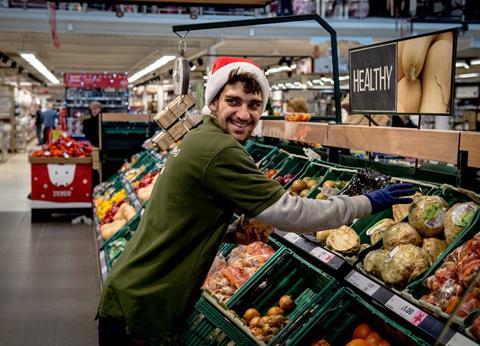UK supermarket December sales surpass £13 billion for first time, Kantar data reveals

Household spending on take-home groceries hit a record high this Christmas at £460 on average, according to the latest data from Kantar.
Overall take-home sales at the grocers rose by 2.1 per cent over the four weeks to 29 December compared with last year, surpassing £13 billion for the first time ever, Kantar said.
The data suggests shoppers were in the mood to spend despite 3.7 per cent grocery price inflation – its highest level since March 2024.
Commenting on the results Fraser McKevitt, head of retail and consumer insight at Kantar, said: “In contrast to reports of disappointing footfall across the rest of the high street, it was a very different story in the world of grocery.
”The average household made nearly 17 separate shopping trips this December, delivering the busiest month for the retailers since the pre-lockdown rush in March 2020.
”As anticipated, Monday 23 December was the most popular shopping day of the year, with sales a whopping 30 per cent higher than any other day during 2024.”
People were also willing to splash out that little bit more than usual, as sales growth for branded goods accelerated to 4.2 per cent, while premium own-label lines jumped by 14.6 per cent, according to Kantar. The latter now account for a record 7 per cent of all sales, as nine in 10 households bought at least one of these products in December.
In terms of retailer performance, Britain’s largest grocer Tesco saw growth across its convenience, superstore and online channels contributing to a 5 per cent increase in sales over the 12 weeks to 29 December. Its 0.8 percentage point share gain was the biggest of any supermarket, taking its hold of the market to 28.5 per cent.
Sainsbury’s achieved its highest share since December 2019 at 16 per cent thanks to sales growth which outpaced the market at 3.5 per cent. Morrisons sales rose by 0.4 per cent with its share standing at 8.6 per cent. Asda now holds 12.5 per cent of the market.
McKevitt added: “More people chose to do some of their Christmas grocery shopping online this year with 5.6 million households opting for delivery or click and collect services on at least one occasion. Online spending for the month reached a record £1.6 billion. This saw Ocado boost its sales by 9.6 per cent over the 12 weeks, taking its overall share to 1.8 per cent.”
Discount retailers Lidl and Aldi achieved their highest ever Christmas shares at 7.3 per cent and 10 per cent respectively. Lidl secured the fastest footfall growth of any retailer as spending through its tills increased by 6.6 per cent. Aldi’s sales were up 2.9 per cent, as it attracted an additional 315,000 customers to its stores.
Waitrose market share remained at 4.6 per cent with spending increasing by 2.1 per cent. Iceland’s sales rose by 1 per cent, giving the frozen food specialist a 2.3 per cent share. Convenience retailer Co-op’s portion of the market is now 5.3 per cent.
Outside of the grocers, food and drink spending at M&S increased by 8.7 per cent, driven by strong performance in its core fresh and chilled range (9 per cent higher) and ambient lines (11 per cent greater) across the 12 weeks.



